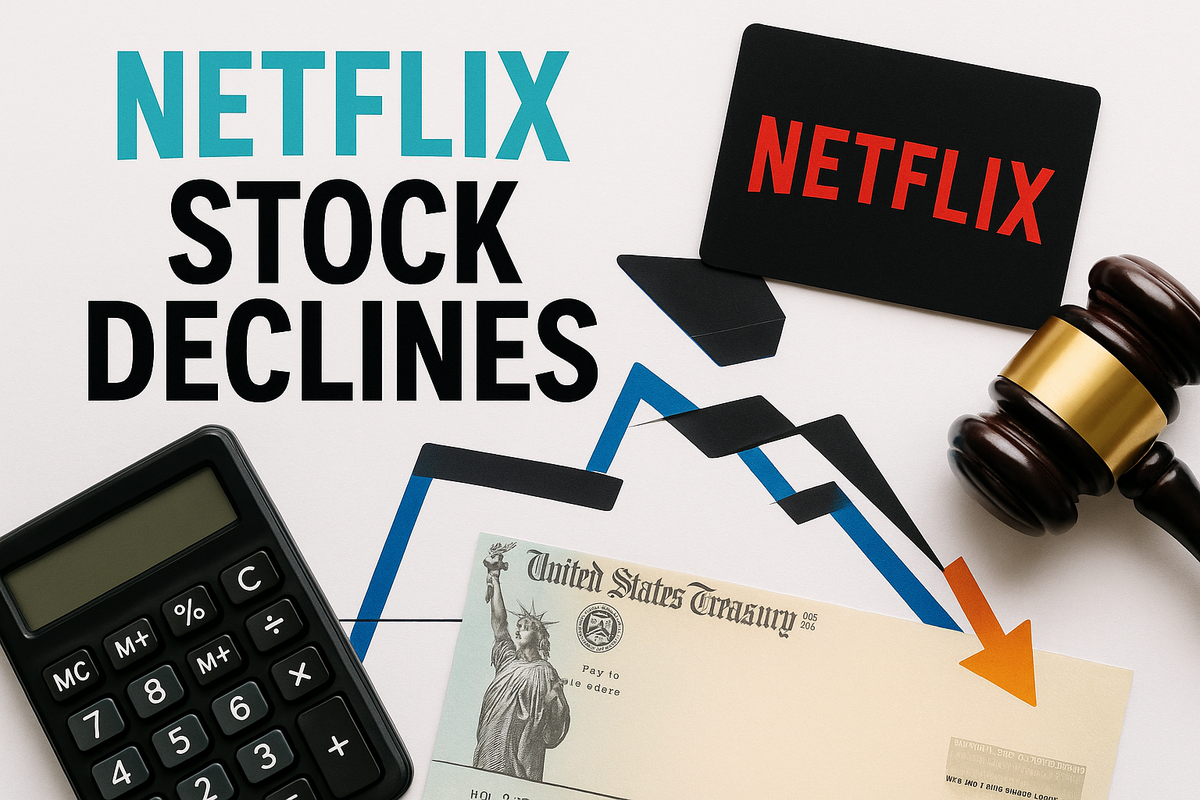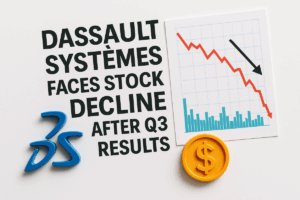Netflix’s stock price has recently declined sharply, falling by over 6% following a disappointing third-quarter earnings report. This downturn is primarily attributed to a significant tax dispute with Brazilian authorities, raising questions about the company’s future performance and investor confidence.

Table of Contents
Key Facts
In its latest earnings report, Netflix revealed several critical data points that contributed to the stock’s decline. The company reported earnings per share (EPS) of $5.87, missing analyst expectations of $6.97, while revenue for the quarter was $11.51 billion, aligned with forecasts but slightly below prior guidance. The unexpected $619 million tax expense stemming from the Brazilian dispute heavily impacted operating income, which fell to $3.24 billion, about $400 million short of expectations. Despite this setback, Netflix reported a 17% year-over-year revenue increase and a net income of $2.55 billion, up from $2.36 billion in the same period last year.
Looking ahead, Netflix has adjusted its operating margin forecast down from 30% to 29% due to this tax issue, while maintaining a full-year revenue projection of $45.1 billion, a 16% increase from the previous year. The company also noted a strong content lineup for the fourth quarter, including anticipated hits like the final season of ‘Stranger Things’ and new films from notable directors.
Analysis and Interpretation
The sharp decline in Netflix’s stock can largely be attributed to an unexpected tax expense, highlighting vulnerabilities in the company’s financial planning and forecasting. The tax dispute, which has been ongoing for years, culminated in this significant charge that was not factored into prior earnings guidance. Analysts have expressed concern that this earnings miss could signal a broader slowdown in Netflix’s growth trajectory, particularly as the company transitions its focus from subscriber growth to financial performance. This strategic shift reflects the changing dynamics of the streaming market, where competition is intensifying.
Despite the declines, Netflix’s management remains optimistic about its future, emphasizing that engagement metrics remain robust. The growth in advertising revenue, particularly through the new ad-supported tier, is expected to provide a new revenue stream. However, the market’s reaction suggests cautious sentiment among investors, as the competitive landscape continues to evolve, with players like Amazon and Apple expanding their content offerings.
Technical indicators suggest Netflix’s stock may remain volatile as it navigates these challenges. The stock has been consolidating for weeks, with analysts watching for a potential breakout at $1,341.15, its all-time high reached earlier this year. The adjustment to operating margin expectations may also weigh on investor sentiment.
Market Impact
The implications of Netflix’s earnings miss and tax dispute extend across various asset classes. In the equities market, the decline in Netflix’s stock has affected investor sentiment, particularly within the technology and entertainment sectors. Competitors such as Disney+ and HBO Max are likely to capitalize on Netflix’s challenges, potentially gaining market share as consumers evaluate their streaming options.
In the currency markets, the U.S. dollar remains stable against major currencies, suggesting that investor caution may not be confined to Netflix alone but reflects broader market uncertainties. The bond markets are also reacting, with U.S. Treasury yields remaining low as investors seek safe-haven assets amid concerns about corporate earnings.
Commodities have remained relatively unaffected by Netflix’s specific challenges, but the overall economic climate, influenced by the technology sector’s performance, may indirectly affect commodity prices. The streaming service’s focus on ad revenue also indicates a shift in market dynamics, as advertisers adjust their strategies to respond to changing viewer habits.
Scenarios
Considering Netflix’s current situation, several potential scenarios could unfold in the near future:
Base Scenario: Netflix continues to face challenges due to the Brazilian tax issue and increased competition, leading to modest revenue growth and potential volatility in stock performance. The company stabilizes its earnings but does not see significant short-term stock price growth.
Optimistic Scenario: The company successfully navigates its tax dispute, leading to a favorable resolution that reassures investors. Strong content offerings drive subscriber engagement and significantly boost ad revenue, resulting in a stock price rebound.
Pessimistic Scenario: Ongoing challenges with the tax dispute and intensifying competition lead to a decline in subscriber numbers, and revenue growth stalls. Investor confidence erodes further, leading to a deeper decline in stock prices as analysts revise their forecasts downward.
Conclusion
In summary, while Netflix’s recent earnings report highlighted both challenges and opportunities, the unexpected tax expense has raised questions about its financial health and growth trajectory. The company’s ability to adapt to regulatory challenges and innovate in its content strategy will be crucial in maintaining its competitive edge in the evolving streaming landscape. Investors remain cautious, and the coming quarters will be pivotal for Netflix as it seeks to reaffirm its market position amidst increasing competition.
Sources
- https://www.cnbc.com/2025/10/21/netflix-nflx-earnings-q3-2025.html
- https://www.theguardian.com/media/2025/oct/21/netflix-earnings-tax-brazil
- https://finance.yahoo.com/news/netflix-stock-falls-after-earnings-miss-estimates-operating-profit-takes-a-hit-201113517.html
- https://www.investors.com/news/technology/netflix-stock-nflx-q3-2025-earnings/
- https://www.livemint.com/market/stock-market-news/netflix-shares-fall-6-5-after-missing-q3-earnings-estimates-what-led-to-the-drop-11761093676320.html
- https://artificall.com/analysis/companies/netflix/


